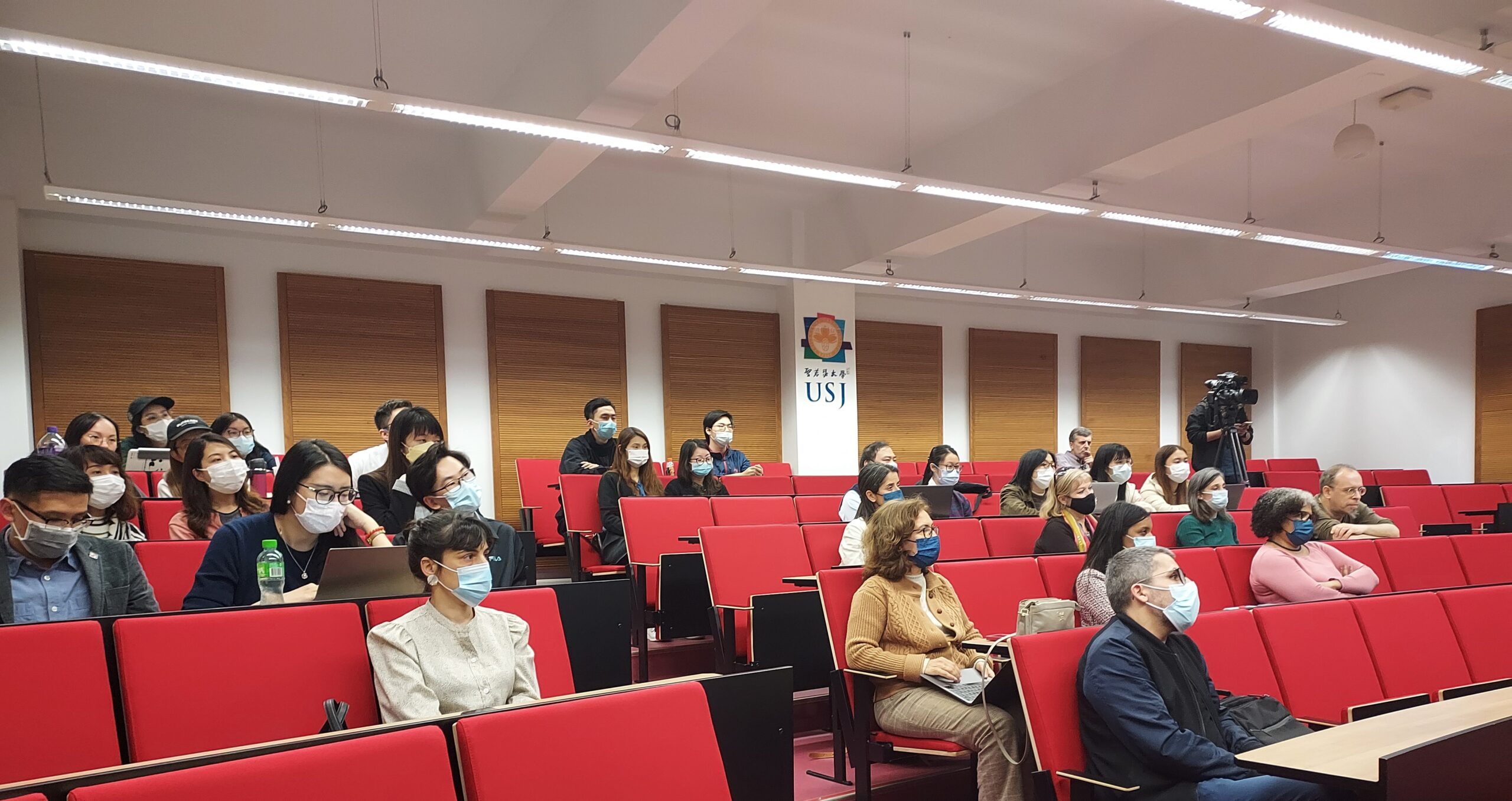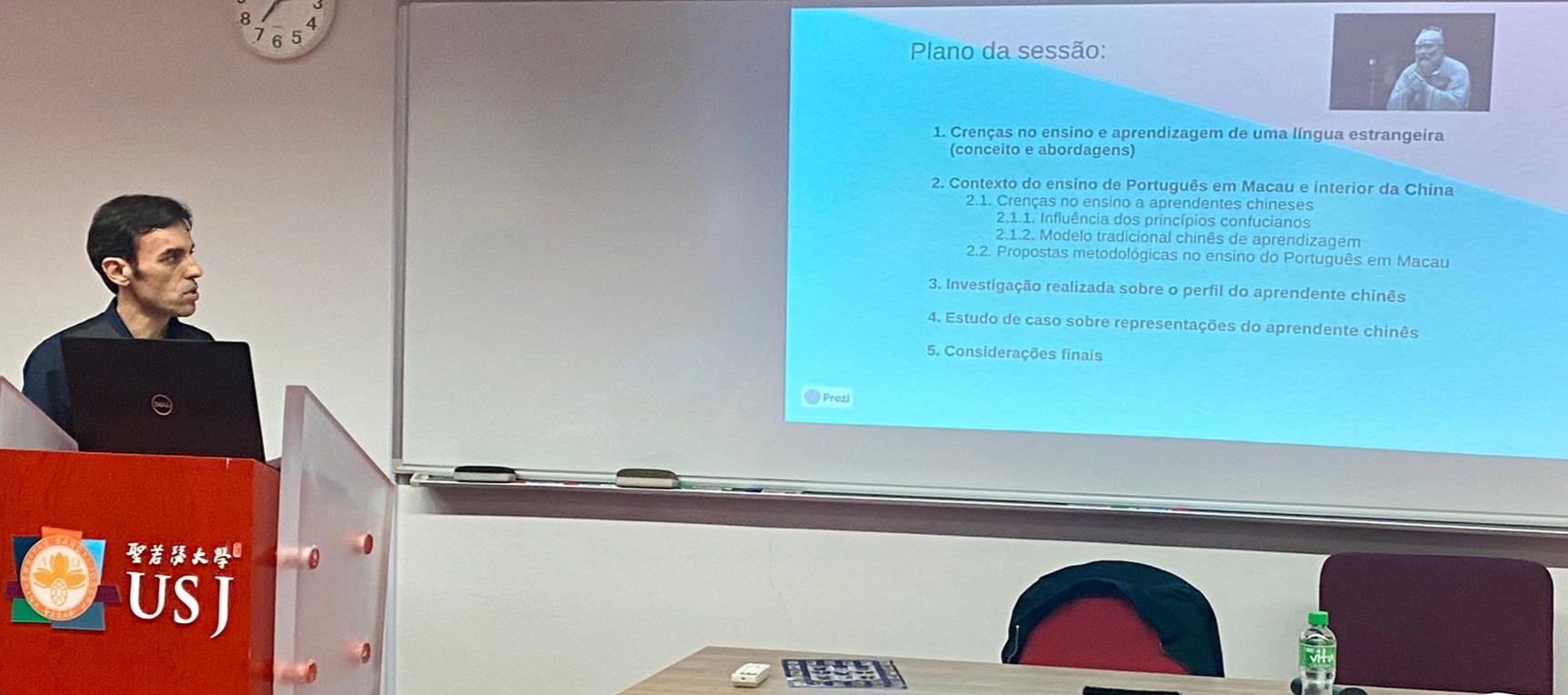Prof. João Paulo Pereira delivered a conference on “Visions of Confucius in the classroom of Portuguese as a Foreign Language in Macau: between tradition and modernity”

Prof. João Paulo Pereira delivered a conference on “Visions of Confucius in the classroom of Portuguese as a Foreign Language in Macau: between tradition and modernity"
04
Apr
04/04/2022
Prof. João Paulo Pereira delivered a conference on “Visions of Confucius in the classroom of Portuguese as a Foreign Language in Macau: between tradition and modernity”, on March 29.
On the 29th of March, 2022, Prof. João Paulo Pereira from the Department of Languages and Culture of the Faculty of Arts and Humanities (FAH), delivered the public lecture “Visions of Confucius in the Class of Portuguese as a Foreign Language in Macau: Between tradition and modernity” at the University of Saint Joseph (USJ) Don Bosco Auditorium, within the scope of the Master’s in Portuguese as a Foreign Language/Second Language (offered by USJ and the Catholic University of Portugal).
This conference had as its central theme the foundation of beliefs concerning the Chinese learner in Macau. Since these beliefs are socially constructed, we tried to understand the socio-educational context of Macau, at the origin of the segmentation and the hierarchy of the educational institutions (serving different communities), and its contribution to the belief system that was set in place. As the teaching of Portuguese in Macau (dating from the 16th century, through the action of the Colégio de São Paulo) had a great influence on the language teaching methodologies adopted throughout China, a presentation of these methodologies and the characterization of Portuguese teaching in Mainland China was in order.
Beliefs related to the Chinese learner were then identified. Research has proved that the Chinese learners have been considered to be passive and reluctant to intervene. They would also prefer perfectly controlled activities that appeal to memorization and repetition. Based on these beliefs, proposals have also been implemented, based on the adoption of specific teaching methodologies for the Chinese learning public, which were reviewed.
In addition to the socio-educational context of Macau, one of the most important factors to contribute to this belief system is related to the influence of Confucian principles. Therefore, the topic of the respect and veneration for the authority figure ( the teacher) and related texts by Confucius were also addressed. The traditional Chinese method of learning, with repetition, memorization and reproduction at its core, was also discussed.
The results of a case study carried out in various educational establishments in Macau (Escola Portuguesa de Macau, Instituto Português do Oriente and University of Macau) were then presented, in order to verify if the belief system that was formed in relation to the Chinese learner, is really at work in MSAR educational landscape. The results of this study were published in a scientific article in the journal Linguarum Arena, Journal of Studies in Didactics of Languages of the University of Porto.
The public lecture was covered by TDM (Chinese learners’ behavior: a study by the University of Saint Joseph: https://www.tdm.com.mo/pt/sharelink/news/673487?s=pc
###
No passado dia 29/03/2022 o Prof. João Paulo Pereira do Departamento de Línguas e Cultura da Faculdade de Artes e Humanidades, proferiu a conferência “Visões de Confúcio na Aula de Português Língua Estrangeira em Macau: Entre tradição e modernidade”, no âmbito do Mestrado de Português Língua Estrangeira/Língua Segunda (oferecido em parceria pela Universidade de São José e pela Universidade Católica de Portugal).
Esta conferência teve como tema central a formação de crenças em relação ao aluno chinês em Macau. Uma vez que são socialmente construídas, procurou-se perceber qual o contexto socioeducativo de Macau, que provocou uma segmentação e hierarquização dos espaços educativos e contribuiu para o sistema de crenças que se formou. E dado que o ensino do Português em Macau (que data do séc.XVI, por ação do Colégio de São Paulo) teve uma grande influência nas metodologias de ensino de línguas adotadas em toda a China, fez-se também uma apresentação dessas metodologias e a caracterização do ensino do Português no Interior da China.
Foram então identificadas as crenças relativas ao aprendente chinês, que o consideram como sendo passivo, renitente em intervir e que prefere atividades perfeitamente controladas que apelem à memorização e repetição. Com base nestas crenças surgiram propostas a defender a adoção de metodologias de ensino específicas para o público aprendente chinês, revistas na conferência.
Para além do contexto socioeducativo de Macau, outro dos vetores que contribuiu para a formação deste sistema de crenças prende-se com a influência dos princípios confucianos. O respeito e a veneração pela figura da autoridade (o professor) e textos de Confúcio que o comprovam foram também abordados. O método tradicional chinês de aprendizagem, no qual a repetição, a memorização e a reprodução têm um papel central, foi também discutido.
Foram apresentados os resultados de um estudo de caso efetuado em vários estabelecimentos de ensino de Macau (Escola Portuguesa de Macau, Instituto Português do Oriente e Universidade de Macau), no sentido de verificar se o sistema de crenças que se formou em relação ao aprendente chinês encontra correspondência na realidade educativa do Território.
Os resultados desse estudo constam de um artigo científico publicado na revista Linguarum Arena, Revista de Estudos em Didática das Línguas da Universidade do Porto,.
A conferência foi coberta pela TDM (Comportamento dos alunos chineses: um estudo da Universidade de São José: https://www.tdm.com.mo/pt/sharelink/news/673487?s=pc
###











